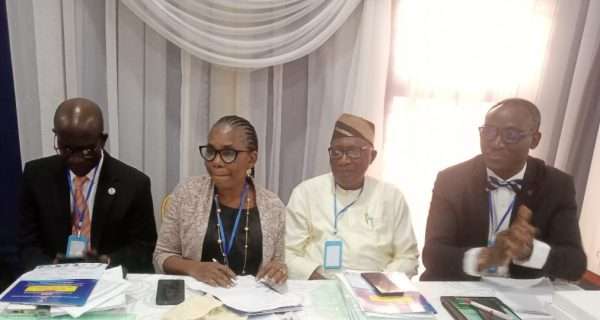– Say private providers must be involved in implementation

Despite their misgivings about the new National Health Insuranc Authority (NHIA), healthcare providers, under the aegis of the Healthcare Providers Association of Nigeria (HCPAN), Lagos State Chapter, have tasked the new administration of President Bola Ahmed Tinubu to develop the political will to effectively implement the scheme and ensure Universal Health Coverage in the country.
The professionals gave the charge at the recent HCPAN’s Mid-Year Meeting and Capacity Building, held at the Lagos Chamber of Commerce and Industry (LCCI), Alausa, Lagos, with the theme, “Operationalising the NHIA Act 2022: The Actuaries Viewpoint”.
Chairman of the association, Pharm. Abiola Paul-Ozieh, noted that the goal of Universal Health Coverage in Nigeria, through the window of health insurance as the financing option, is feasible, if well-coordinated.
Stressing that everything falls and rises on the table of leadership, Paul-Ozieh stated that the new government must demonstrate a strong commitment to the NHIA, by ensuring transparency, keeping the public abreast of its progress and bringing all concerned stakeholders on board.
She added that those sitting in the driver’s seat of NHIA at the national and state levels must be on the same page, so as to ensure that the populace gets adequately enrolled in the scheme and receives optimal service delivery.
While calling for the separation of professional roles among healthcare providers, the HCPAN leader asserted that for optimal healthcare service delivery, there must be strict adherence to stratification as primary, secondary and tertiary healthcare facilities. She reiterated that basic healthcare provision should be done by primary care providers, which comprise public primary healthcare centres and numerous independent standalone clinics and hospitals spread across the states.
“An effective referral system must be put in place. Under no circumstances, must teaching hospitals, specialist hospitals and general hospitals be providing primary care services,” she averred.
Paul-Ozieh also maintained that healthcare providers must be adequately and promptly remunerated according to their services, adding that the two payment mechanisms of capitation for primary care providers and fee-for-service for secondary care providers should be upheld.
“Under no circumstances should a primary care provider warehouse the funds for secondary care providers. Block capitation to primary care providers, as practised under NHIS should be unbundled, such that the fee-for-service components can be paid directly to the secondary care providers, namely, specialist centres, laboratories, radiographic centres, pharmacies, physiotherapy, optometric centres, as this will assure a sense of inclusiveness and efficiency in the system, “she advised.
Paul-Ozieh added: “Healthcare providers in the private sector provide over 60 per cent of healthcare in Nigeria, especially in Lagos State. So, we must be carried along in whatsoever policy the government is making. Without private healthcare providers, public providers can go fast but, they are not likely to go far. For them to go far, regarding the implementation of the NHIA 2022, we must carry the private healthcare providers along, and those terrible healthcare indices we see would change.”
Also speaking at the event, Dr Austin Aipoh, national president, HCPAN, stressed that the new government must put the required structures and funding in place, as obtained in other countries, for Nigerians to enjoy UHC.
“For us to enjoy the new Act, the government will have to show political will to be able to implement the new act to the fullest. The new government should be able to release the fund when due, the budgetary allocation for health that we see on paper should be released truly, and once there is budgetary allocation, there should be budgetary implementation. They should even increase the allocation,” he said.
In his remarks, the chairman of the occasion, Dr Umar Oluwole Sanda, observed the need for the providers to come together under a common interest.
Sanda, a former president of HCPAN, noted that health insurance is the future of healthcare in the country, adding that a workable, affordable health insurance scheme that will be inclusive and lucrative to all healthcare providers is achievable.
His words, “We need a robust debate to move the scheme forward, and we must be ready to engage the government on this. I however want to appeal to fellow providers not to be deterred by the rough terrain we are passing through, as our journey to our destiny and destination has started well and should be sustained by all.”
In her speech, titled “Overview of the Lagos State Health Scheme (LSHS): The LASHMA Update and Providers”, Dr Emmanuella Zamba, general manager, LASHMA, explained that the Lagos State Health Scheme is mandatory for all residents of the State, and all employees in the public and private sectors, including the self-employed and the unemployed.
She added that the overall goal of the LSHS is to ensure that all residents of Lagos have unhindered access to quality healthcare services in an efficient, sustainable, and equitable manner.
“Providers are identified as a key structure in community dynamics. In ideal community settings, the hospital is a symbol of hope and care; the community members also trust the healthcare leadership.
“Also, the providers have a key role in achieving UHC, not only by providing quality care but also service to enlighten, educate and inform people in the community about the scheme and follow-up on premium payments.,” she said.
The highpoint of the event was the panel discussion on health insurance scheme implementation, regulatory framework and collaboration, which had Dr Austin Aipoh, Dr Leke Oshunniyi, Mr Emeka Okoji and Mr Abiola Oshunniyi, as panellists; as well as Dr Raymond Abiodun Kuti, as moderator.
During the discussion, stakeholders present at the programme, including operators of health maintenance organisations (HMOs), medical practitioners, pharmacists, and laboratory scientists, called on the Federal Government to address the bottlenecks that prevented the success of NHIS, so that the NHIA would not end up same way.











